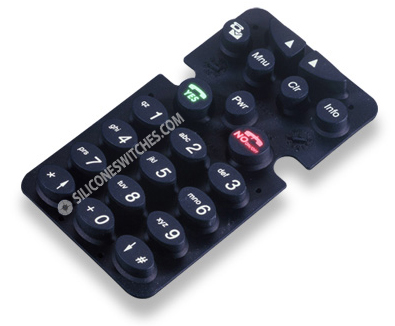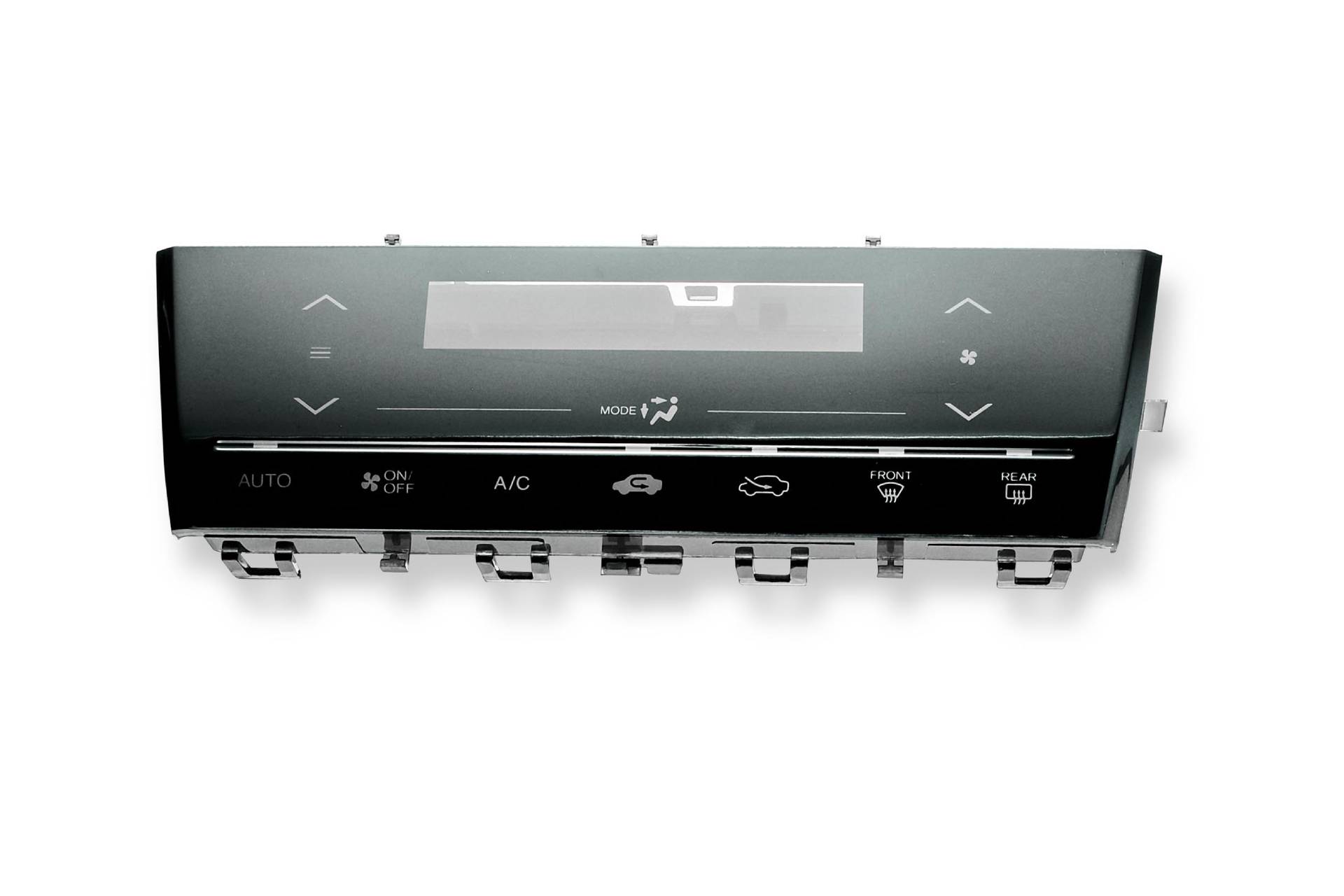8 sectors that depend heavily on Rubber Keypads for operations
Wiki Article
Finding the Diverse Keys In and uses of Rubber Keypads in the Technology Landscape Today
Rubber keypads have actually established themselves as necessary elements in various technical applications. Their flexibility makes them suitable for customer electronic devices, industrial machines, and medical devices. As these keypads proceed to develop, new personalization choices and style trends arise. This triggers a more detailed assessment of their benefits and producing processes. Comprehending these components might disclose why rubber keypads continue to be a favored selection in the technology landscape. What lies ahead for this functional component?Introduction of Rubber Keypads
Rubber keypads offer as a basic part in different electronic devices, providing a tactile interface for user interaction. These keypads are commonly made from silicone or rubber materials, which offer flexibility and longevity. Their design frequently includes increased letters or icons, boosting use by enabling users to feel the keys - Rubber Keypads. Rubber keypads are resistant to dust, wetness, and use, making them ideal for requiring atmospheresThey can be personalized relating to dimension, form, and shade, enabling manufacturers to develop distinct user interfaces customized to certain products. The manufacturing procedure commonly entails methods such as molding and printing, making certain premium output. Therefore, rubber keypads not just boost functionality however also add to the overall appearances of the tool. With these characteristics, rubber keypads remain a prominent selection for both suppliers and customers, highlighting their significance in the modern technology landscape.
Typical Applications in Consumer Electronic Devices
While numerous electronic tools rely upon touchscreens for customer communication, rubber keypads proceed to play a crucial duty in customer electronics. These keypads are extensively used in tools such as remote controls, video gaming controllers, and house home appliances, where responsive feedback boosts user experience. Their durability and resistance to put on make them optimal for gadgets regularly subjected to hefty usage.Rubber keypads are likewise preferred in smart phones and mobile devices, where portable designs demand reliable and receptive input approaches. The capability to customize the form and appearance of rubber keypads allows producers to produce unique designs that appeal to consumers. Additionally, the soft touch of rubber supplies convenience throughout prolonged usage, making these keypads a recommended option for devices calling for extended interaction. On the whole, rubber keypads remain an essential element in the customer electronics landscape, integrating functionality with straightforward functions.
Role in Industrial and Medical Equipment
Rubber keypads play an important duty in both medical and industrial equipment, using longevity and integrity popular environments. In industrial settings, they are usually utilized in control panels and machinery, enhancing operator communication with complicated systems. Similarly, in the medical area, rubber keypads promote easy to use interfaces for gadgets that need precision and health.Industrial Tools Applications
Keypads play an important duty in the performance and individual experience of medical and industrial equipment. In commercial setups, rubber keypads give a robust interface for machinery and control systems, enabling drivers to quickly input commands and adjust setups. Their resistance to dirt, wetness, and chemicals assurances dependability under extreme conditions common of factories and making plants. Additionally, the responsive feedback used by rubber keypads improves user interaction, minimizing the chance of input mistakes. Along with traditional machinery, these keypads are integral in automated robotics and systems, where precision is critical. The convenience of rubber keypads in various industrial applications emphasizes their significance in boosting functional efficiency and guaranteeing safety in complicated atmospheres.Medical Tool Combination
As clinical tools significantly require user-friendly user interfaces, the assimilation of rubber keypads has actually ended up being vital in guaranteeing efficient interaction between health care experts and tools. These keypads provide tactile comments, promoting user-friendly operation even in high-pressure settings. Their durability and resistance to extreme cleaning agents make them optimal for clinical setups, where hygiene and longevity are important. Additionally, rubber keypads can be personalized to include numerous forms, sizes, and shades, boosting aesthetic acknowledgment and access for customers. This adaptability permits the production of specialized controls customized to specific clinical features, boosting total performance. Consequently, the role of rubber keypads in medical tool combination not just improves capability but also promotes person safety and operational reliability in health care atmospheres.Personalization Options and Style Trends
Current layout patterns emphasize minimalism and functional designs, focusing on customer convenience and user-friendly interaction. Custom-made logos and branding can be incorporated into keypads, permitting companies to keep a cohesive brand identity across their products. Additionally, innovations in manufacturing techniques, such as silicone molding, have made it easier to achieve detailed layouts and personalized designs.
Benefits of Rubber Keypads Over Various Other Kinds

Rubber keypads are additionally recognized for their toughness and resistance to ecological variables. They can hold up against temperature, moisture, and dirt changes, making them perfect for outdoor or industrial settings. In addition, rubber keypads are often quieter than their plastic or steel counterparts, minimizing sound pollution in common atmospheres.
In addition, the cost-effectiveness of rubber keypads makes them an eye-catching option for suppliers. Their light-weight nature contributes to reduce shipping prices, while their personalized layouts deal with details branding needs. On the whole, rubber keypads stand for a flexible and trusted service in the technology landscape.
Manufacturing Techniques for Top Quality and Resilience
In the production of rubber keypads, the choice of proper products and molding procedures plays a crucial role in determining total top quality and sturdiness. Numerous molding methods, such as compression and injection molding, significantly affect the end product's performance. Understanding these variables is crucial for achieving ideal cause rubber keypad production.Molding Procedures Described
A range of molding processes play an essential duty in the manufacturing of rubber keypads, making sure both high quality and sturdiness. One of the most common strategies include compression molding, transfer molding, and shot molding. Compression molding involves putting rubber in a heated mold, where heat and pressure form it right into the desired form. Transfer molding allows for more exact control over material flow and is suitable for intricate designs (Rubber Keypads). Shot molding, recognized for its rate and performance, injects liquified rubber into a mold and mildew under high stress, producing high-volume components with regular high quality. Each technique offers distinctive benefits, influencing factors such as production expense, layout, and rate versatility, inevitably influencing the efficiency and life expectancy of rubber keypads in various applicationsMaterial Option Relevance
Material selection plays a vital function in the manufacturing of rubber keypads, directly affecting their performance and explanation toughness. The selection of rubber substances, such as silicone or polyurethane, impacts responsive feedback, resistance to put on, and ecological longevity. Premium products guarantee that keypads can endure substantial usage, preserving their functionality gradually. Additionally, the formulation of rubber influences its resistance to temperature fluctuations and direct exposure to chemicals, which are crucial for devices in different environments. Using advanced production methods, such as compression or shot molding, more boosts the architectural honesty of keypads. Eventually, cautious material choice and production procedures contribute considerably to the general top quality, durability, and individual satisfaction of rubber keypads in today's innovation landscape.Future Patterns in Rubber Keypad Technology
As modern technology remains to progress, the future of rubber keypad development appears promising, with advancements poised to enhance functionality and individual experience. One significant trend is the combination of touch-sensitive innovation, making it possible for capacitive responses that imitates the feeling of conventional switches while giving enhanced responsiveness. Furthermore, the development of antimicrobial materials is likely to get traction, resolving hygiene concerns in common and public tools.Additionally, personalization alternatives are anticipated to increase, allowing individuals to personalize crucial formats and responsive feedback, therefore satisfying diverse demands. The unification of smart technology, such as connection functions, may also emerge, permitting rubber keypads to interact with other gadgets effortlessly. As suppliers concentrate on sustainability, environmentally friendly materials are anticipated to come to be extra widespread, straightening additional info with international environmental goals. Overall, these trends guarantee to reinvent rubber keypads, making them more flexible, straightforward, and eco aware in the innovation landscape.
Regularly Asked Concerns
Just How Do Rubber Keypads Compare in Cost to Various Other Keypad Kinds?
Rubber keypads normally supply an affordable solution contrasted to various other keypad kinds, such as membrane layer or mechanical options. Their reduced production expenses and toughness make them an eye-catching choice for different applications in modern technology.What Are the Environmental Influences of Rubber Keypad Production?

The environmental influences of rubber keypad manufacturing include resource depletion, power consumption, and pollution from producing processes. Furthermore, incorrect disposal can result in plastic waste, adding to ecological destruction and hurting communities if not handled responsibly.
Can Rubber Keypads Be Made Use Of Outdoors?
Rubber keypads can be used outdoors due to their toughness and resistance to weather components. Nevertheless, their longevity might depend upon the quality of products made use of and the particular ecological conditions they are subjected to.What Maintenance Is Needed for Rubber Keypads?
Rubber keypads call for regular cleansing to remove dust and debris, routine inspection for deterioration, and defense from extreme temperatures. Guaranteeing appropriate storage problems can extend their lifespan and keep performance with time.Exactly How Do Rubber Keypads Perform in Extreme Temperatures?
Rubber keypads normally maintain performance in severe temperatures, exhibiting durability to both warmth and cold. However, prolonged direct exposure might cause material deterioration, impacting their responsive action and total efficiency in severe environments.Rubber keypads offer as an essential part in various electronic devices, providing a responsive user interface for customer communication. While several electronic gadgets depend on touchscreens for individual interaction, rubber keypads continue to play an important role in customer electronic devices. Additionally, the soft touch of rubber supplies convenience during long term usage, making these keypads a favored option for devices needing prolonged interaction. Despite the growing range of keypad materials offered, rubber keypads provide unique advantages that make them a recommended choice in lots of applications. Rubber keypads generally provide a cost-efficient service contrasted to other keypad kinds, such as membrane layer or mechanical alternatives.
Report this wiki page